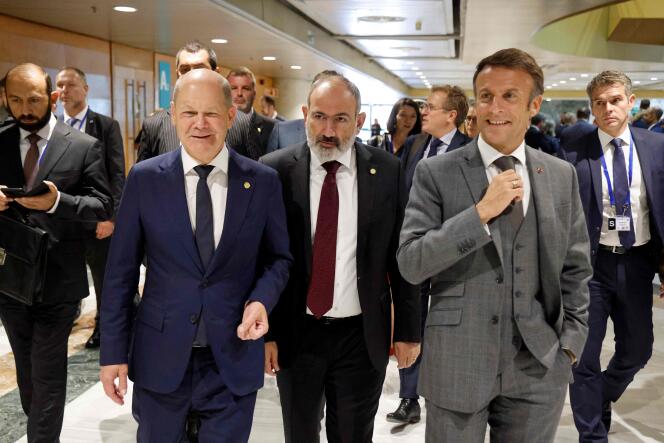


After meeting for the first time in Prague in October 2022 and subsequently in Chisinau in June, about 40 heads of state and government from across Europe, including the EU Twenty-Seven and most neighboring countries (excluding Russia and Belarus), gathered in Granada, Spain, on Thursday, October 5, for the third edition of the European Political Community (EPC) summit. Turkish President Recep Tayyip Erdogan did not make the trip and his Azerbaijani counterpart and ally Ilham Aliev denounced an "anti-Azerbaijani" and pro-Armenian atmosphere to justify his absence.
"It's a shame" said the head of European diplomacy, Josep Borrell, "it means we won't be able to talk here about something as serious as the fact that over 100,000 people had to hastily abandon their homes to flee a military offensive." Talks between Armenia and Azerbaijan, mediated by Paris, Berlin and the EU, were to be one of the highlights of the Granada summit. But Azerbaijan announced on Thursday that it would prefer to meet with Armenia under the aegis of the EU alone, a meeting now expected to take place by the end of the month.
Meanwhile, Armenian Prime Minister Nikol Pachinian met European Council President Charles Michel, French President Emmanuel Macron and German Chancellor Olaf Scholz in Granada. He also met Ukrainian president Volodymyr Zelensky, who has attended every EPC summit and wants "stability" in the region, if only because he needs the full support of the West.
Another absentee was Recep Tayyip Erdogan, who had already decided not to travel to Chisinau. "This is a bad signal, given that the EPC was also conceived as a channel for dialog with Ankara," said Sébastien Maillard, special advisor to the Jacques Delors Institute. While the Turkish president's absence was understandable in June as he had just been re-elected, it did not go over so well in Granada.
The third edition of the EPC also failed to kickstart a new round of talks between Kosovo and Serbia. Pristina was represented by its president, Vjosa Osmani rather than by its prime minister, Albin Kurti, who is the custodian of power. "If only second-raters attend this kind of meeting, it weakens its impact. At a time when power relations are becoming increasingly brutalized, the EPC's framework for dialog is fragile," said Maillard.
When he launched the idea of the EPC on May 9, 2022, a few weeks after Russia's invasion of Ukraine, Macron himself had no idea what the new format would be used for, other than to regularly bring together European countries beyond the EU's borders. "The EU cannot be the only means of structuring the continent," he explained, at a time when, in the face of Moscow's expansionism, Ukraine, Moldavia, Georgia, and the Western Balkans are knocking on its door.
You have 43.88% of this article left to read. The rest is for subscribers only.
